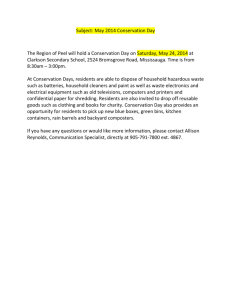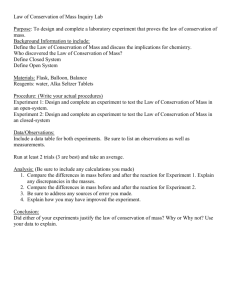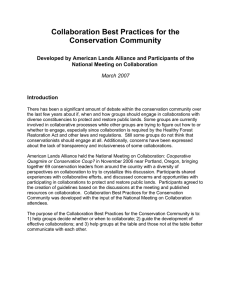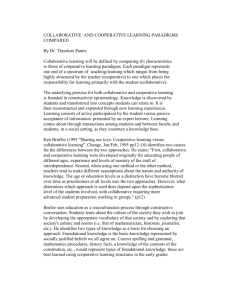Themes from facilitated discussions, August 30
advertisement
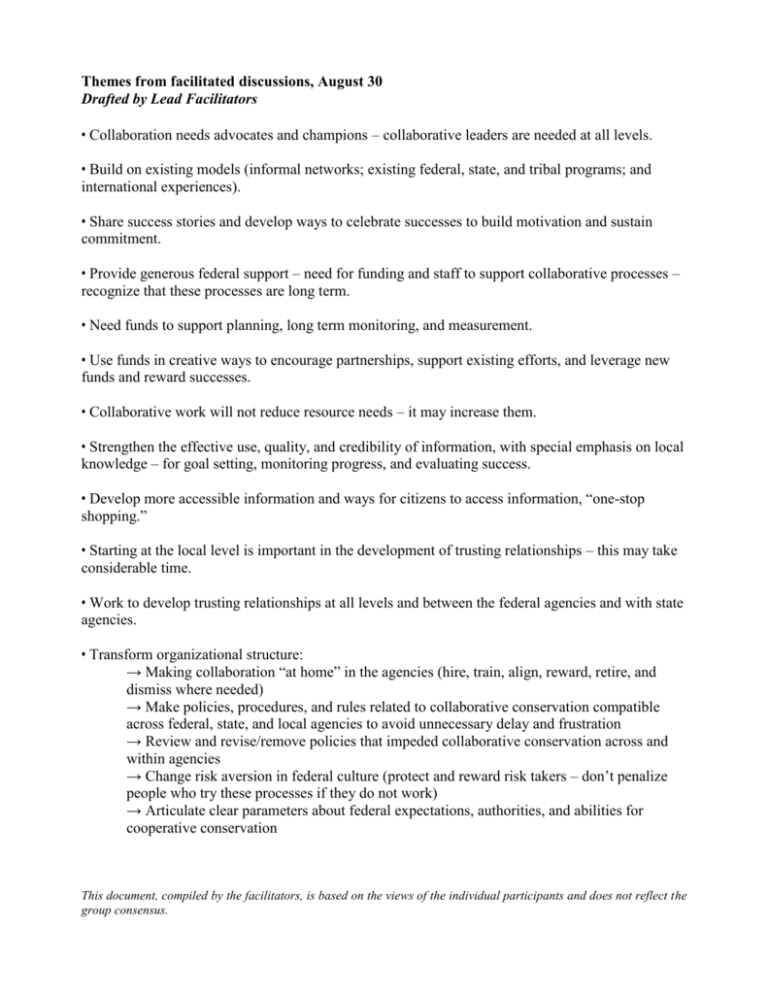
Themes from facilitated discussions, August 30 Drafted by Lead Facilitators • Collaboration needs advocates and champions – collaborative leaders are needed at all levels. • Build on existing models (informal networks; existing federal, state, and tribal programs; and international experiences). • Share success stories and develop ways to celebrate successes to build motivation and sustain commitment. • Provide generous federal support – need for funding and staff to support collaborative processes – recognize that these processes are long term. • Need funds to support planning, long term monitoring, and measurement. • Use funds in creative ways to encourage partnerships, support existing efforts, and leverage new funds and reward successes. • Collaborative work will not reduce resource needs – it may increase them. • Strengthen the effective use, quality, and credibility of information, with special emphasis on local knowledge – for goal setting, monitoring progress, and evaluating success. • Develop more accessible information and ways for citizens to access information, “one-stop shopping.” • Starting at the local level is important in the development of trusting relationships – this may take considerable time. • Work to develop trusting relationships at all levels and between the federal agencies and with state agencies. • Transform organizational structure: → Making collaboration “at home” in the agencies (hire, train, align, reward, retire, and dismiss where needed) → Make policies, procedures, and rules related to collaborative conservation compatible across federal, state, and local agencies to avoid unnecessary delay and frustration → Review and revise/remove policies that impeded collaborative conservation across and within agencies → Change risk aversion in federal culture (protect and reward risk takers – don’t penalize people who try these processes if they do not work) → Articulate clear parameters about federal expectations, authorities, and abilities for cooperative conservation This document, compiled by the facilitators, is based on the views of the individual participants and does not reflect the group consensus. • Collaboration needs to recognize tribal sovereignty at the outset. • Timelines and cycles of the federal government do not mesh well with collaborative projects (turnover, administrative deadlines, budget cycles, and election cycles). • Sometimes even a well-designed cooperative conservation effort can be jeopardized by “late hits” (e.g. changing the decision-making framework, legal challenges). • Need to recognize and manage the inevitable tension between national policies and local interests. → Integrate representation of local and national constituencies in cooperative conservation → Goals should reflect both federal and local interests • Recognize that collaborations and partnerships that are initiated voluntarily are often most effective. Recognizing the importance of local initiation is vital. • Projects should be developed and implemented in a holistic and sustainable manner – often at the ecosystem or landscape scale. • Need to prepare for and address unintended consequences. • Look for unlikely models and partners to develop multi-purpose projects. • Initiate collaborative processes and partnerships early – before a crisis occurs. • Full inclusion is important and it can be difficult to achieve – even a challenge at this conference. • Need to involve people who are close to the land or resource in cooperative conservation – land owners, recreationists, sportsmen. • There is a tension between the virtues of uniformity and flexibility – can cooperative conservation address this tension? • One size does not fit all – collaborations need to be flexible and adaptable. • Recognize the key role that states and tribes play in fostering and implementing partnerships and collaborations. This document, compiled by the facilitators, is based on the views of the individual participants and does not reflect the group consensus. 2





